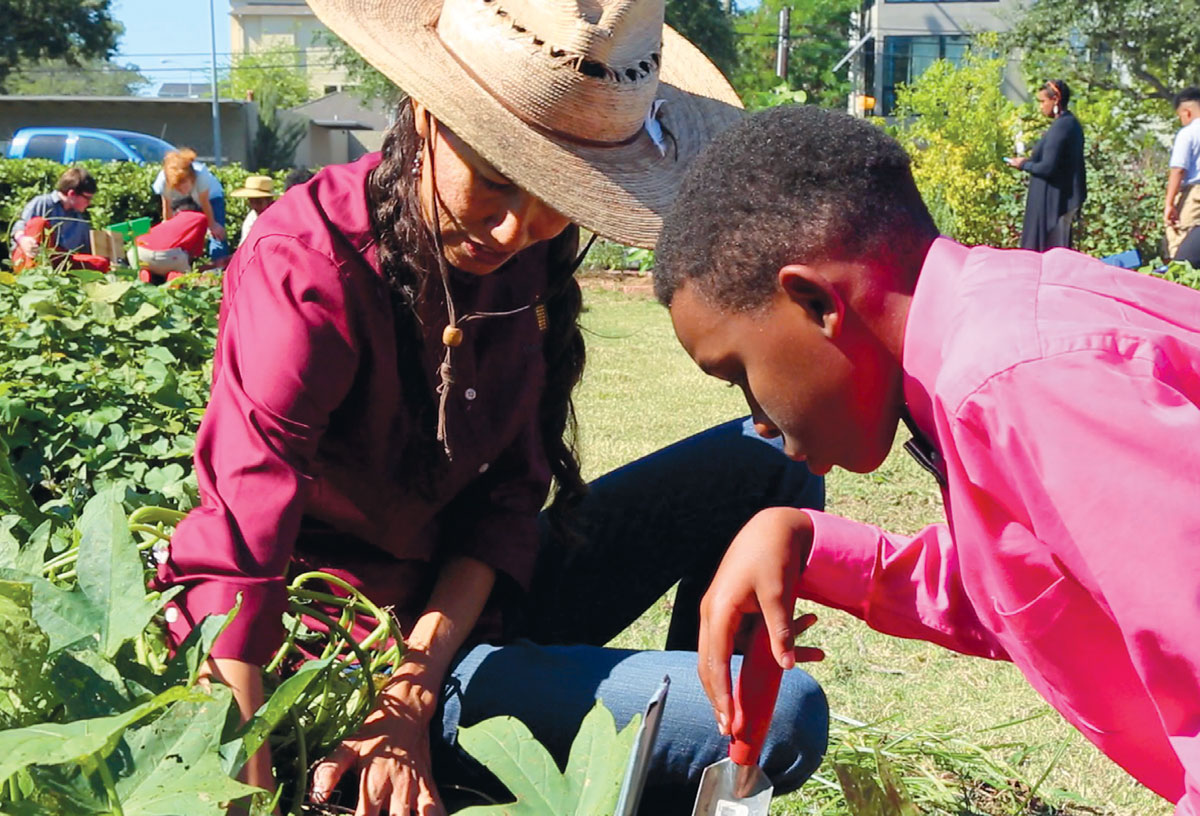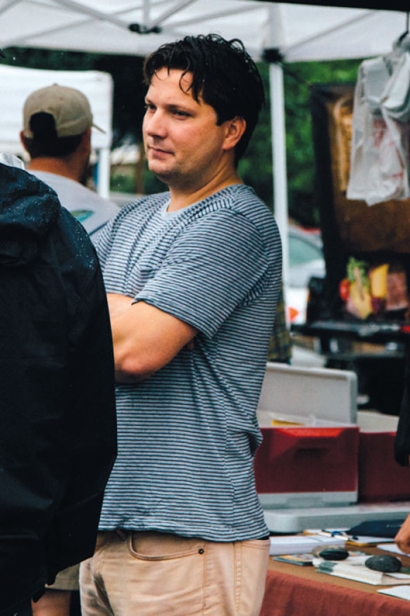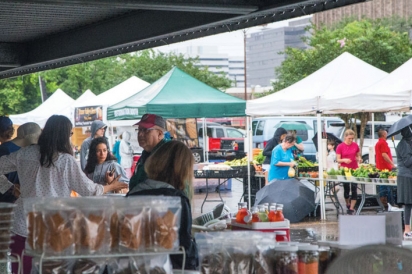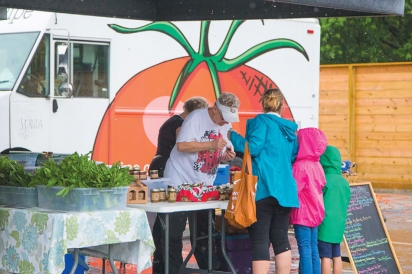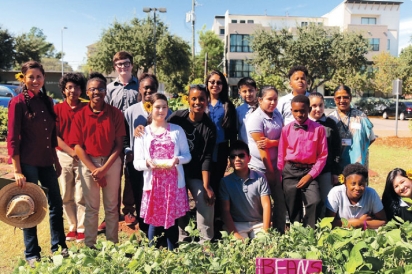Urban Harvest - Teaching, Planting, Growing and Selling
Urban Harvest embraces local food from community gardens to farmers markets
On any given Saturday, the Urban Harvest Eastside Farmers Market buzzes with people shopping, grabbing a bite to eat, listening to live music and catching up with friends. Whether they’re regulars at the market or occasional visitors, they find a place to support local businesses, socialize and connect with farmers and neighbors.
Established in 2004, the Eastside Market gathers a diverse group small farmers, ranchers and businesses from within a 180-mile radius of Houston who bring their products to market each week. One can find anything from local meats and produce to honey, cheese and olive oil. Food trucks cater to hungry patrons and dog rescues set up shop at the market to find adoptive families for their pups.
Tyler Horne, farmers market director for Urban Harvest, manages the market and coordinates all the small details—from the music to the chef demos—that make it a weekly destination for many Houston residents. “We’re trying to make it a convenient place that has a well-rounded shopping experience, so people don’t feel like they have to go straight to the grocery store after here,” said Horne, who also manages Urban Harvest’s City Hall Farmers Market.
The Eastside Market is Houston’s largest farmers market and it has grown to become a visible part of Urban Harvest’s work to encourage sustainability and improve access to healthy food in Houston. But the organization’s reach stretches far beyond farmers markets. “We’re the champions of growing local food, supporting other people who grow local food, and increasing access to healthy food for people who may not have it,” said Sandra Wicoff, Urban Harvest’s executive director since 2013.
With a staff of 10 and the help of volunteers, Urban Harvest offers organic gardening classes, supports community gardens, and brings outdoor classrooms to Houston schools. No easy feat for a small staff—and its efforts continue to grow.
GROWING MINDS
On a Wednesday in mid-May, a group of middle schoolers at Gregory Lincoln Education Center, a public magnet school in the fourth ward, stand in the hallway that leads out to the school’s garden. Kellie Karavias, culinary and garden educator at the school, goes over the tasks that need to be completed. They’re listed on a white board: harvest Swiss chard; plant a cover crop of black-eyed peas; put beds to sleep for the summer; seed saving; and sautéing harvested greens.
Students sign up for tasks and get to work. Carol Burton, director of youth gardening for Urban Harvest, helps one group of students harvest all the green beans in bed number seven. The soil will then be tilled and covered with cardboard, compost and leaves to prevent weeds from growing while school is out during the summer.
Over on bed three, students work on harvesting the Swiss chard, placing torn leaves into a separate bin to feed them to the school’s flock of laying hens. Meanwhile, another group of students films the class as part of a school project.
In the 2015–2016 school year, 4,300 students in 25 Houston schools received hands-on organic gardening and nutrition education like this. Burton estimates that partner schools hold about 100 classes per year—and demand for the program is growing. To meet that need, Urban Harvest held its first Edible Academy in June. The program is a one-day workshop to train teachers on how to integrate school gardens into their curriculum.
The garden at Gregory Lincoln is a model of what can be accomplished. Lessons about soil, composting, growing and harvesting can be integrated into core school subjects and give kids an understanding about nutrition and where their food comes from. Michelle Williams, whose sixth grader attends Gregory Lincoln, is a regular volunteer at the garden. “It’s been an awesome experience to enjoy the garden and experience how to grow food,” she said.
IMPROVING ACCESS TO FOOD
Gardens, like the farmers markets, also build community. At Gregory Lincoln, people from all socioeconomic backgrounds come together at monthly work days to tend to the garden and enjoy breakfast. “It really levels the playing field when you’re talking about food and kids, so it brings everybody together,” said Karavias.
Urban Harvest has also seen success with its Earth Day work day, which it launched last year to bring out volunteers for a day of service at its community gardens. The organization supports a network of more than 100 affiliate community gardens, a majority of which serve food deserts and low-income areas, through free classes and community engagement. The goal is to help improve access to nutritious food.
“We have a lot of areas where people are not able to get to grocery stores regularly,” said Wicoff . “It’s a problem everywhere, but Houston’s statistics are not good in that regard.”
Another way they’re addressing the issue is through a new pilot program called Fresh Start. Instead of building new gardens, the program focuses on revitalizing struggling community gardens in underserved areas and encouraging people to grow their own food.
GET THEM GROWING
Other programs also encourage people to grow their own food. Urban Harvest holds some 100 classes per week to teach anyone interested in growing food about permaculture and organic vegetable gardening. Between 2014 and 2015, more than 1,000 attended. It also holds an annual fruit tree sale. At this year’s sale, Urban Harvest sold 3,700 trees, an 11% jump from the previous year.
Since it was founded in 1994, Urban Harvest’s mission has been to encourage community, good nutrition and sustainability through education. It has done so year after year and the high demand for its programs is a sign that it won’t be slowing down. Wicoff encourages people to continue to support the organization—whether by visiting a farmers market, taking a class, volunteering or donating. “It’s very, very important that we’re in this together to build a sustainable future for the region,” she said.
> For more information, visit urbanharvest.org.


